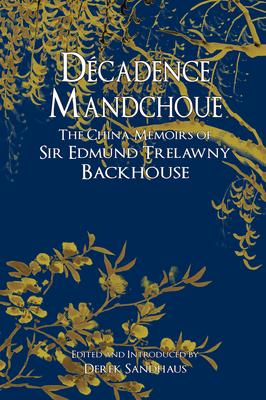In 1898 a young Englishman walked into a homosexual brothel in Peking and began a journey that he claims took him all the way to the bedchamber of imperial China's last great ruler, the Empress Dowager Tz'u Hsi. Published now for the first time, Dcadence Mandchoue, the controversial memoirs of sinologist Sir Edmund Backhouse, provides a unique and shocking glimpse into the hidden world of China's imperial palace, with its rampant corruption, grand conspiracies and uninhibited sexuality. Backhouse was made notorious by Hugh Trevor-Roper's 1976 bestseller, Hermit of Peking, which accused Backhouse of fraudulence and forgery. Dcadence Mandchoue, written shortly before the author's death, lay for decades forgotten and unpublished in the Bodleian Library at Oxford University, dismissed by Trevor-Roper as nothing more than "a pornographic novelette." But Dcadence Mandchoue is much more than that. Alternately shocking and lyrical, it is the masterwork of a linguistic genius, a tremendous literary achievement and a sensational account of the inner workings of the Manchu dynasty in the years before its collapse in 1911. If true, Backhouse's chronicle completely reshapes our understanding of the era, and provides an account of the Empress Dowager and her inner circle that can only be described as intimate.

In 1898 a young Englishman walked into a homosexual brothel in Peking and began a journey that he claims took him all the way to the bedchamber of imperial China's last great ruler, the Empress Dowager Tz'u Hsi. Published now for the first time, Dcadence Mandchoue, the controversial memoirs of sinologist Sir Edmund Backhouse, provides a unique and shocking glimpse into the hidden world of China's imperial palace, with its rampant corruption, grand conspiracies and uninhibited sexuality. Backhouse was made notorious by Hugh Trevor-Roper's 1976 bestseller, Hermit of Peking, which accused Backhouse of fraudulence and forgery. Dcadence Mandchoue, written shortly before the author's death, lay for decades forgotten and unpublished in the Bodleian Library at Oxford University, dismissed by Trevor-Roper as nothing more than "a pornographic novelette." But Dcadence Mandchoue is much more than that. Alternately shocking and lyrical, it is the masterwork of a linguistic genius, a tremendous literary achievement and a sensational account of the inner workings of the Manchu dynasty in the years before its collapse in 1911. If true, Backhouse's chronicle completely reshapes our understanding of the era, and provides an account of the Empress Dowager and her inner circle that can only be described as intimate.